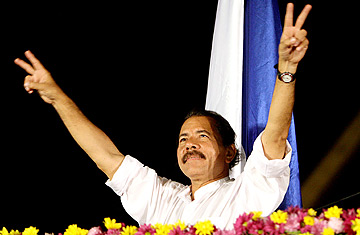
Former Nicaraguan president and President-elect Daniel Ortega at a campaign rally in November 2006 in Managua.
But on Wednesday, when Ortega takes office again after winning last November's presidential election, both he and the world will look markedly different. The Cold War is a distant memory, and Ortega, the leader of the left-wing Sandinista party, has pledged to be a more moderate and market-friendlier leader. And while he says he wants to work with the U.S. this time around, the Bush Administration has also learned from Ortega's victory — which it worked hard and loud to prevent — that it can no longer manipulate events in one of the hemisphere's poorest countries. On Monday, President Bush even called Managua to congratulate Ortega and discuss areas of bilateral cooperation.
Ortega will need it because, unfortunately, what hasn't changed all that much is Nicaragua itself: still impoverished, inequitable and grossly underdeveloped, reminiscent of the country Ortega took over after Sandinista guerrillas toppled the brutal right-wing dictator Anastasio Somoza Debayle. SUVs fill the parking lots of new shopping malls, million-dollar homes dot the Pacific coastline and nearly everyone seems to carry a cell phone, but around 80% of Nicaraguans live in poverty, the social security system is bankrupt, a growing number of people are without access to healthcare or education and half the countryside remains without electricity or potable water.
What's more, while Ortega rode into Managua 27 years ago with a euphoric mandate for revolutionary change, he won in November with a paltry 38% of the vote, which means he'll have to walk a tightrope between Nicaragua's rich and poor, religious conservatives and dyed-in-the-wool leftists — and, more important, between the hemisphere's ideological poles, the U.S. and radical left-wing Venezuelan President Hugo Chavez, a strong Ortega ally. Ortega "is in a difficult position," says Nicaraguan political analyst Alejandro Serrano. "But it's the only road he can take."
It will take some skillful driving. The U.S. is Nicaragua's most important trading partner, a relationship that was fortified last year when Nicaragua signed on to the U.S.-Central America Trade Agreement (CAFTA). Ortega acknowledges that Nicaragua's economic future depends in large part on U.S. investment. But Ortega also insisted recently that "if we are really going to be a free market, we can't limit ourselves to just one market." And that's a line straight from Chavez's anti-U.S. Bolivarian Revolution, which is intent on playing as large a role in Nicaragua's development as Washington: Chavez, who controls the hemisphere's largest oil reserves, plans to help alleviate Nicaragua's critical energy crisis with discounted crude on generous financing terms and the funding of development banks for Nicaraguan farmers.
Not surprisingly, Bush made a point in his call this week that the U.S. hopes to step up its own micro-credit programs for Nicaragua as well as Washington's Millennium Challenge project to aid free-market democracies. "Ortega's attempt to be on good terms with both Washington and Caracas will be a test of his political skill," says Michael Shifter of the Washington, D.C., think tank Inter-American Dialogue. "It will be tough but not impossible, as long as the U.S. and Chavez don't force Ortega to choose."
That's an open question, given the imperious bent in both the Bush and Chavez Administrations. Optimists point to the post-election visit to Managua of Thomas Shannon, Bush's Assistant Secretary of State for the Western Hemisphere, when Shannon emphasized that the U.S. would look forward to working with its erstwhile Cold War nemesis. Still, "the relationship between Washington and Managua depends fundamentally on Washington," says Nicaraguan historian and political analyst Aldo Diaz Lacayo. "The honeymoon will last as long as the U.S. remains reasonable, but if the U.S. allows itself to be influenced by old prejudices and fears, it will end" and Nicaragua could be pushed further into Chavez's arms. Another Nicaragua watcher, the philosopher Noam Chomsky, whose works are a favorite of Chavez's, warns that Ortega "will be partially acceptable to the U.S. as long as his policies conform to U.S. government demands."
Others, however, insist that in 2007 it's hard to see how Nicaragua, even with Chavez's largesse, can pull itself out of its economic hole without the U.S. As a result, says Serrano, Ortega has his own "moral and historical obligation to the country" to be reasonable — and not push away the superpower he thought he could beat all those years ago.
